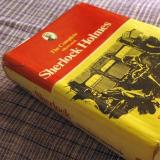
When the first sea-creatures braved the shores of a primitive Earth and pulled themselves on to dry land, their attempts were probably not the prettiest thing to look at. They were still getting to grips with, and even inventing, the basic mechanics of locomotion with rudimentary limbs in the open air. They were aeons away from the grace of a gazelle leaping confidently through the grasslands, but eventually they’d get there, once they’d figured out which over-developed fin to push forward before the other, to manage some semblance of direction without the enveloping water.
As writers and new explorers of communication with the written word, we too are often merely getting by, more involved in the basic mechanics of language and expression than attempting grace. In time, as the mechanics of writing become second-nature and we can consign the nuances of verbs, clauses and grammar to a well-trained subconscious, we begin to wonder about grace and personality in what we write, and thus we set out to find our writing voice.
A writer’s voice is a sum total of many definable things, but in itself eludes simple definition. While mechanical structures like grammar and vocabulary, and patterns such as pace and tone can be pinned down in words to varying degrees, the writing voice is the emergent character that results from all those features, a personality, a certain cadence to our words and the ideas they weave. This general writing style in time becomes a writer’s most distinguishing mark in a realm where we all have the same words to work with. It also becomes the most powerful aspect of a writer’s craft because the non-analytical reader, the vast majority who read for pleasure, will pick up on the voice in your writing before they ever do your technique. Your voice is what they will learn to love or hate, admire or dismiss; Your voice in your writing is what the average reader will come back for.
As with all literary technique, this personality in words can ascribed to all sorts of clever formulae and tricks, but ultimately the way to develop your unique writer’s voice is a matter of practice and more practice. As social creatures we often start by emulating the written cadence of the writers we enjoy reading and those who have influenced us most recently, but keep writing and in time a more unique character will emerge that is all your own. While that is the crux of it, there are things you can do to better guide you from the rudiments of dragging yourself through the mud of basic writing proficiency to the effortless sprinting through phrase and fecundity. You as much develop your writing voice as you find it, and this evolution has some helpful patterns to follow.
Expand your influences
the genetic pool

With our hard-wired social thinking of ‘monkey see, monkey do’ it’s easy to see why imitation is our first route to learning something as individual as a writing voice. Biologically speaking, it’s a perfectly valid way to learn and it saves us from having to reinvent the wheel with every generation. With creative expression, however, we are looking not just to emulate the best solutions of the past but also to grow and evolve a unique expression of our own. One way to do this is to make sure you are influenced by as wide a variety of sources as possible.
If only one kind of creature had tried to walk on land out of some primordial ocean, we’d all look a lot more similar as we went about foraging for food and purpose every morning, whether in suits or furs. But because some pulled, some pushed, some wriggled and some crawled into an air-breathing existence, the genetic pool of land-creatures was wide enough as to produce the variety you see today, each solution with its own unique grace, its own specific personality.
If you take the same route every day and never observe the people and sights along the way in an unaware stupor, you have very little to work with as a writer. The same goes for more direct written influences. If you only read one kind of book as a reader, the chances are you will only imitate that for the rest of your writing life. We all have favourites, of course, and there’s nothing wrong with that, but keeping in mind our natural tendency to emulate, a variety of influences gives us a variety of raw material to imbibe, mix and re-mix until we form our own written cadence. As a writer, you often end up being defined as much by all the things you don’t read and so it helps to read as widely as you can within reason, so that when you do find your writing voice, it is evolved from informed choice rather than from ignorance.
Talk to yourself
natural selection

Writing journals and diaries is something writers have been recommended to do for ages, and there is some strength in that claim. It’s not just for the exploration of your inner self, as most would think, or as a useful record of thoughts and conclusions, but also in the simple matter of developing your writing voice.
I’ve found talking to myself in my notes and logs to be useful in many practical, self-searching ways, but I have also found that as I have grown accustomed to writing and hence sharing my thoughts with myself in writing, I have become more casual, personal and unmistakably myself in my written tone of voice. We can be truly delusional when it comes to assessing our own talents and capabilities, but it is also true that there can be no harsher critic of unnecessary affectations in our words and writing style than our inner critic. Writing to yourself and for yourself can be an excellent way to kick-start this inner editor.
With ourselves, we have the most freedom, and in being ourselves in writing lies the key to evolving a proper writing voice. The harsh inner criticism helps in this case because you are the lest likely to tolerate anything in your writing style that is in the least bit disingenuous. Others might never know and your craft might mask any stylistic facade with sufficient conviction, but it’s difficult to fool yourself when you’re talking to the one person who can see through it. Writing to yourself is a great way to cut out the dead weight in your writing style, and thus hone your writer’s voice to its most honest core.
Experiment with language
mutation

To have all this method is well and good, and quite straight-forward to implement in your own writing, but your method really can use some madness to give it that edge. Influences and raw materials are useful, your inner critic is useful, but the occasional bout of pure random chance prodded on by foolish bravado can often result in much more startling leaps in your writing.
Evolution is not always about slow and gradual development, it is as much about the fortuitous chance, the random change, the chaotic mutation. All creatures have benefited from such random leaps of genetic faith in the history of our development and you can too as a writer, All you have to do is to take some chances on occasion with your language.
Once you are confident with the rules of writing, the mechanics, syntax and structure, try bending those rules on occasion, consciously. Try out an awkward phrase, a mismatched metaphor, an ill-advised adjective and see where it takes you. As much as you might have imbibed the dos and donts of the written word, you never know what will not work for you and with your writing until you give it a try. What do you have to lose? Any ghastly horrors of experimental word-play are only an edit away from respectability, but on occasion your chaotic trials will yield beautiful things, sometimes delicate and sometimes bold and visceral. Either can be a boon to your writing and either can become an element in reading something that is uniquely your work.
Writing is a chance; It’s a series of chances leapt into at various stages of the process. Once you’ve committed yourself to this beautifully risky endeavour, you might as well go all the way and take some chances with your language and your choices too. You never know what turn of phrase and distortion of conventional writing wisdom will come to be your personality in the written word, so take a chance and try out the untried.
As with all things human, it’s easy to paint the writing voice into a corner of methods and techniques that are both unquestionable and also utter rubbish, depending on who you are. It is just as easy to make it some ephemeral magic that happens when the moon is just right and velvet unicorns are spotted on a Sunday. As with all things human, the truth often lies somewhere in the middle of all these opposing directions. Whatever the method or madness you subscribe to, finding your writing voice is something every one who aspires to be a serious wielder of words must put some minimal effort into. Without a voice, your prose might be plump and pretty, your words might be wielded with wisdom and wonder, but they will have no personality. In the long run, it is the personalities we remember, and we all want to be remembered. It is why we write, even if indirectly, to be remembered for who we are and what we think and what we say, so make sure you say it and write it in a voice no one else ever has before, or ever will.
Samir
This article was instigated and inspired by a question in a reader’s comment on my thoughts on clear-headed writing. Thank you Satlih.
Liked this article? Please share it: ![]()
![]()
![]()
![]()
![]()
![]()



thank you…
if you have the time this is a link to my blog, it’s made of thoughts and reflexions that mature in my mind and come out mostly in a few lines. english is not my native language but i can express myself better using it.
i wish you a lot of inspiration and success in all your endeavours.
http://vodkabitter.blogspot.com/
Antonija
I´m not a writer, I´m a designer and a baker, and guess what? I talk to myself a lot and write too, so I understand what you say, you can´t fool yourself in any way, and I find it very interesting that you do it with a method, and with it you can find your voice, your style. Since I started reading your posts I can say I can hear your voice and I can see a defined style in your writing, no matter what are you talking about 🙂
Magali
I’m an artist, not a writer, but it’s always useful to learn techniques for writing better blog posts.
Intriguing read and eye-catching vintage photos.